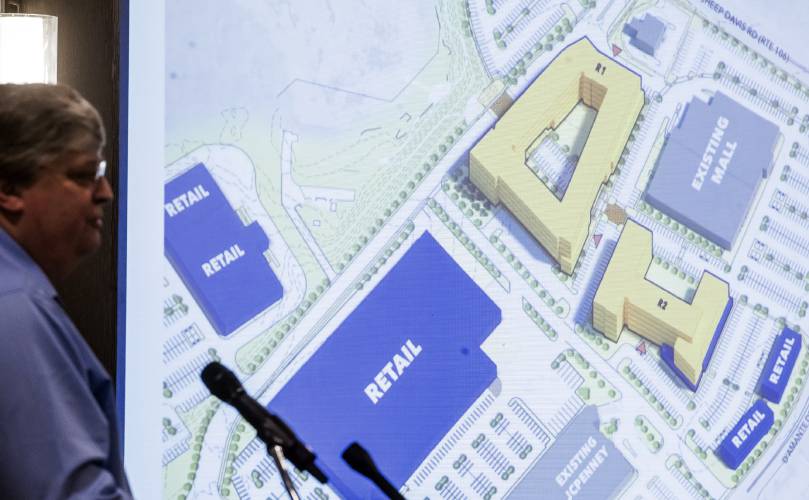Opinion: Concord has a chance to make a big climate move

Doug Richardson, executive vice president of Onyx Partners, show a rendition of the plans for the Steeplegate Mall site on January 11. Monitor file
| Published: 02-10-2024 6:00 AM |
The city of Concord has a golden opportunity to show that it’s serious about its admirable clean-energy goals, but it’s not the sort of opportunity you might think of.
Two huge mixed-use developments are proposed for the city. Between them, they’ll add close to 1,000 apartments and condos and townhouses, which is badly needed, plus a chunk of businesses. That’s the good news.
Here’s the potential bad news. When a Monitor reporter asked about energy supplies to heat and cool these buildings, however, she was told that they are leaning toward natural gas, which has long been the default for developers. They said they’re open to other options, a phrase that might be significant and might mean nothing at all.
Why does this matter? “Electrify everything” is one of the mantras in our attempts to reduce future climate damage for good reason. In particular, it always produces less pollution to do things in buildings via electricity than to do it by setting fire to stuff.
(Counter-intuitively, that’s true even when electricity is largely provided by burning natural gas, as is the case in New Hampshire, because of the increased efficiency of heat pumps and induction stoves over their gas-fired equivalents.)
I’m sure the developers will have some solar panels and EV chargers in the projects — at least, I sure hope so — but that won’t come close to undoing climate damage from adding another 1,000 households and a bunch of businesses burning natural gas in the city. If the pipelines are laid this year, they’ll be burning gas for decades to come.
The question is, what can the city do to keep it from happening?
They could ban new gas hookups, but that is virtually impossible politically. It’s not worth talking about.
Article continues after...
Yesterday's Most Read Articles
 Concord planning board approves new casino zoning
Concord planning board approves new casino zoning
 A May tradition, the Kiwanis Fair comes to Concord this weekend
A May tradition, the Kiwanis Fair comes to Concord this weekend
 Lawyers and lawmakers assert the Department of Education is on the verge of violating the law
Lawyers and lawmakers assert the Department of Education is on the verge of violating the law
 Concord softball’s senior class reflects on a dominant four-year run
Concord softball’s senior class reflects on a dominant four-year run
 Concord solidifies plan to respond to homelessness
Concord solidifies plan to respond to homelessness
 Cottage community rebuilds beloved dock after it was destroyed in boat crash
Cottage community rebuilds beloved dock after it was destroyed in boat crash
They could publicly encourage the developers to use electricity rather than gas (which is what this column is doing). That’s a fine idea, but money talks and it’s generally cheaper to connect with gas, even though it’s more costly to operate down the years.
Realistically, the only real tool that Concord possesses is to provide incentives for going electric in the form of tax breaks or easier permitting. But you can imagine the screams this would produce from gas utilities, from other developers, and from any person who identifies themself as “a taxpayer” at public meetings. It would take a lot of gumption for elected officials to do that.
Alas, Concord couldn’t gird its loins enough to make the city golf course avoid buying gas-fired carts during COVID shortages of electric carts. If they balked at creating a minor inconvenience for some people at a golf course, the possibility of facing a public firestorm to help electrify everything seems unlikely.
But never say never. The increasingly awful impact of climate change is forcing a lot of us to look anew at life choices. Maybe the Capitol City will step up and surprise us.







 Opinion: What it means to be an American
Opinion: What it means to be an American Opinion: Looking forward to resting in motion
Opinion: Looking forward to resting in motion Opinion: Technology and the human brain
Opinion: Technology and the human brain Opinion: Show support for transgender girls
Opinion: Show support for transgender girls
